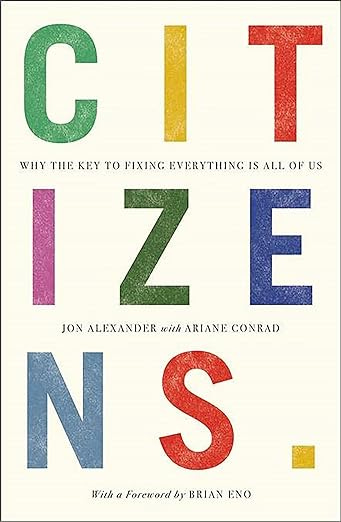Longevity Economy: necessary, but not sufficient
LF91 | The book Citizens helps provide a more elevated framing of demographic opportunities than the consumerist mindset of the 'longevity economy'
The Longevity Economy vs. Climate Crisis
The work by AARP, Joe Coughlin and Oxford Economics, as well as Andrew Scott’s more recent work on the size of the economic opportunity of healthy aging, has provided a powerful economic narrative for why marketers, recruiters, investors and policy makers, among others, should take the older adult market seriously. Despite some powerful numbers change has been still rather slow to materialize.
It reminds me of the first stages of the climate crisis, when scientists (and Al Gore) were warning of the dangers to come, but few people were listening. It took a Greta Thunberg to change the conversation - making it personal, and outrageous that this was happening, using the language of morality and shared humanity, not science.
Making it personal and emotional
In the same way, I think we need to shift the dialogue from a market opportunity to a realistic shared community sense of obligation. We need to own the changes we want to see, not leave it to the market.
This has been an abstract concept until I read Jon Alexander’s Citizens.

From Subject and Consumer to Citizen
The book succinctly shares a bold thesis, that society has evolved from one in which human beings were Subjects - deferring to the whims and fancies of (generally) male overlords; Kings and Dictators who commanded with the threat of violence.
A generally welcome shift in the 20th century, sparked into being by neoclassical economists and accelerated by the rise of Madison Avenue, has been towards Consumerism. Subjects were replaced with Consumers in most democracies, worshipping not royalty but Mammon.
The Consumer story assumes we just want to consume and maximize our own utility, and it’s the duty of companies to make as much profit as possible. A new more enlightened third model, that of the Citizen, points to a new story of shared responsibilities; when the population is trusted to do the right thing and supported to build a better future, collectively.
The book draws on many examples, such as how during Covid most countries started with Big Government, controlling their populace and going heavy on the Subject story. That started to break down as government incompetence / overreach and individual frustration chafed at the lockdowns, and the Consumer story was given an overhaul - do your duty and buy stuff. ‘Eat out to help out’. The Citizen story got a brief look in - such as how in the UK 750,000 people volunteered in 2 days to be first responders, and the weekly Friday night claps for the NHS.
The book shines a light on Taiwan as the world’s leading example of the Citizen story - how they trusted their population, gave them digital tools to vote, to neutralize misinformation, and to help themselves and as a result had far fewer deaths than most other countries, with no lockdown.
Embracing older people as Citizens, not just Consumers
The Citizens models allows us to take control of our own narrative - all of us are responsible for the outcomes of our society, not some all powerful King or the Invisible Hand of the market. Likewise, older people aren’t just cogs in the economic machine, buying stuff, spending their savings, and consuming healthcare (or ideally not).
Older people are an enormous and growing segment of society that can and should be called on to help collaborate and lead. They have expertize and often are underused, which is why I’m excited about MEA, Silver Futures and the Purpose Exchange among others embracing this idea. I also think suggestions to ban people over 50 from voting or participating in the future of society is patronizing and wrong-headed; it embeds the Consumer view that people are just out for themselves.
Let’s assume the best in people and build structures and platforms that allow older people to collaborate and build the future society we all want to see, and not just ask for their credit card.

